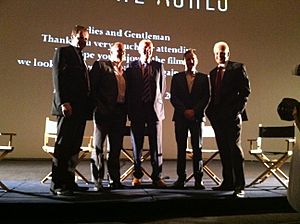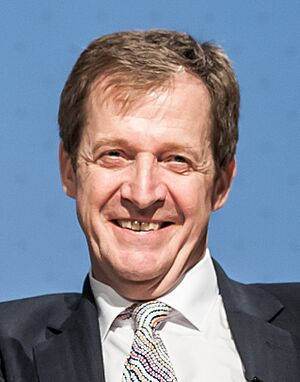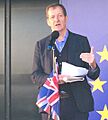Alastair Campbell facts for kids
Quick facts for kids
Alastair Campbell
|
|
|---|---|
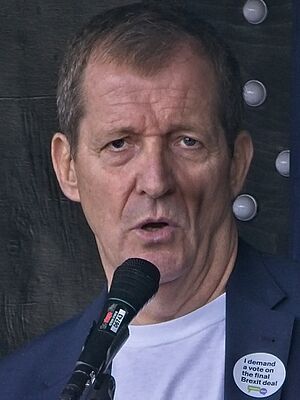
Campbell in 2018
|
|
| Downing Street Director of Communications and Strategy | |
| In office 15 July 2000 – 29 August 2003 |
|
| Prime Minister | Tony Blair |
| Preceded by | Position established |
| Succeeded by | David Hill |
| Downing Street Press Secretary | |
| In office 2 May 1997 – 15 July 2000 |
|
| Prime Minister | Tony Blair |
| Preceded by | Jonathan Haslam |
| Succeeded by | Godric Smith |
| Prime Minister's Official Spokesperson | |
| In office 2 May 1997 – 15 July 2000 |
|
| Prime Minister | Tony Blair |
| Preceded by | Office established |
| Succeeded by | Godric Smith |
| Personal details | |
| Born |
Alastair John Campbell
25 May 1957 Keighley, West Riding of Yorkshire, England |
| Political party | Independent |
| Other political affiliations |
Labour (until 2019) |
| Domestic partner | Fiona Millar |
| Children | 3, including Grace Campbell |
| Education | Bradford Grammar School City of Leicester Boys' Grammar School |
| Alma mater | Gonville and Caius College, Cambridge (BA) |
| Occupation |
|
| Known for | Tony Blair's strategist The Rest Is Politics |
| Signature | |
Alastair John Campbell (born 25 May 1957) is a British journalist, author, and strategist. He is well-known for his important roles in politics during Tony Blair's time as leader of the Labour Party. Campbell worked as Blair's spokesperson and campaign director before Labour won the election in 1997.
After that, he became the Downing Street Press Secretary and the Prime Minister's Official Spokesperson from 1997 to 2000. He then served as Downing Street's director of communications and spokesperson for the Labour Party until 2003. Campbell played a key part in helping the Labour Party win elections and communicate its messages.
Contents
Early Life and School
Alastair Campbell was born on 25 May 1957 in Keighley, West Riding of Yorkshire, England. His father was a Scottish veterinary surgeon, and his mother was from Ayrshire.
He grew up with two older brothers and a younger sister. Campbell went to Bradford Grammar School and City of Leicester Boys' Grammar School. He later studied modern languages (French and German) at the University of Cambridge.
Career in Journalism
After finishing university, Campbell started his career in journalism. He worked at a local weekly paper and became the sports editor at the Tavistock Times.
He later joined the London office of the Daily Mirror newspaper in 1982. He became a political correspondent and then moved to Today newspaper as a news editor. He returned to the Daily Mirror and became its political editor.
In 1993, Campbell became the political editor of Today newspaper.
Working in Politics and Government
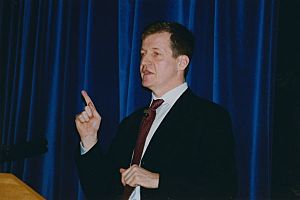
In 1994, after Tony Blair became the leader of the Labour Party, Campbell left journalism. He became Blair's press secretary. He helped create the idea of "New Labour" and was important in the party's victory in the 1997 general election.
Campbell was not just a press spokesperson; he also wrote speeches for Blair and was a chief strategist. He worked with Peter Mandelson to organize Labour's successful election campaign. He also helped gain support from many national newspapers for the Labour Party.
When Labour won the election in May 1997, Campbell became Prime Minister Blair's chief press secretary. He made government briefings public for the first time. Even though he was officially "The Prime Minister's Official Spokesman," he became a very well-known figure in British politics.
He helped modernize how the government communicated. Campbell was also involved in the talks that led to the Good Friday Agreement in Northern Ireland. This agreement helped bring peace to the region.
Campbell also helped NATO improve its communication during the Kosovo War. He was praised for bringing order to their messages. He also played a role in handling the public response after the death of Diana, Princess of Wales. He is said to have helped the Queen make her broadcast more personal.
Campbell also helped with Blair's successful re-election campaigns in 2001 and 2005.
Role in the Iraq War
Before the Iraq War, Campbell was involved in preparing and releasing documents like the "September Dossier" in 2002 and the "Iraq Dossier" in 2003. These documents discussed concerns about weapons of mass destruction in Iraq.
He later resigned from his role in government in 2003.
Later Career and Activities
After leaving his government role, Campbell continued to work in politics. He advised the Labour Party for the 2005, 2010, and 2015 general elections. He also advised other governments and political parties around the world.
Campbell kept a diary during his time in Downing Street, which was very long. Parts of it were published in a book called The Blair Years in 2007. He later published more of his diaries between 2010 and 2018.
He has written for The Times newspaper, analyzing great sports stars. He also has his own website and social media pages where he discusses politics and other topics.
Return to Journalism
In 2014, Campbell joined British GQ magazine to conduct interviews with public figures. He has interviewed many people from politics, sports, and other areas, including José Mourinho, Usain Bolt, Tony Blair, and Prince William.
He also became a columnist for the International Business Times in 2016. In 2017, he was appointed editor-at-large of The New European newspaper.
In 2019, Campbell launched a podcast with his daughter Grace called Football, Feminism and Everything In Between. In 2022, he started another popular podcast, The Rest Is Politics, with Rory Stewart. This podcast discusses current news and politics.
In May 2023, Campbell published his eighteenth book, But What Can I Do?. This book encourages people to get more involved in politics. It became a bestseller in the UK.
Campaigning for a Public Vote
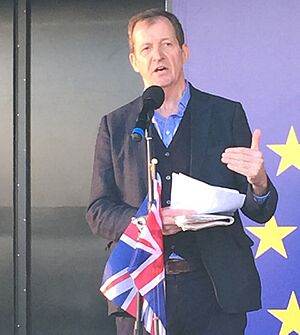
After the UK voted to leave the European Union in 2016, Campbell became a strong supporter of the People's Vote campaign. This campaign argued for a public vote on the final Brexit deal.
He helped organize large marches in London in 2018 and 2019, where many people gathered to support a new vote on Brexit. He also advised French President Emmanuel Macron during his election campaign.
Mental Health Advocacy
Campbell has openly shared his experiences with depression. He is a strong supporter and advocate for the Time to Change campaign, which aims to reduce the stigma around mental illness.
In 2017, he was made an honorary fellow of the Royal College of Psychiatrists. This was in recognition of his work to break down the stigma of mental illness. He has also made documentaries and written a novel about mental health.
Leaving the Labour Party
In May 2019, Campbell announced that he had been removed from the Labour Party. This happened after he voted for the Liberal Democrats in the European elections as a protest. He wanted Labour to support a public vote on Brexit more clearly.
He appealed the decision but later decided not to rejoin the party. He voted for Labour in the 2019 general election.
Personal Life
Alastair Campbell entered into a civil partnership with British journalist Fiona Millar in 2021. They had been together for 42 years. They have two sons and a daughter, the comedian Grace Campbell.
Campbell's older brother, Donald, had schizophrenia and passed away in 2016. His brother's experience inspired Campbell to advocate for better mental health services.
Campbell is a lifelong supporter of Burnley F.C. football club. He is also a fan of the rugby league club Keighley Cougars.
In his free time, Campbell plays the bagpipes to relax. He is also a keen runner, cyclist, swimmer, and triathlete. He has raised a lot of money for charity through these activities.
Portrayals in Media
Alastair Campbell has been portrayed in several films and television shows. He was played by Jonathan Cake in the 2005 film The Government Inspector. Mark Bazeley played him in the 2006 film The Queen and again in The Special Relationship in 2010.
He was also portrayed by Alex Jennings in A Very Social Secretary and by Adam Damerell in season 6 of The Crown. Many people believe he was the inspiration for the character of Malcolm Tucker in the BBC comedy The Thick of It.
Television Appearances
Campbell has appeared on various television programmes. He took part in Soccer Aid in 2006 and 2007 to raise money for UNICEF. He also appeared on Comic Relief Does The Apprentice in 2007.
In 2009, he was a mentor on the BBC Two series The Speaker, offering advice on public speaking. He appeared on Top Gear in 2010 and Jamie's Dream School in 2011.
He has also been a guest presenter on Have I Got News for You and presented a BBC Panorama documentary. In 2012, he had a small acting role in the BBC drama Accused.
In 2021, Campbell was featured in the BBC series Winter Walks. In 2022, he appeared in the Channel 4 series Make Me Prime Minister.
Honours
- Honorary Fellowship of the Royal College of Psychiatrists (2017)
- Gold Medal of Honorary Patronage by the Philosophical Society, Trinity College Dublin (2019)
Published Books
- The Blair Years (2007)
- All in the Mind (2008)
- Diaries Volume 1: Prelude to Power 1994–1997 (2010)
- Diaries Volume 2: Power and the People 1997–1999 (2011)
- Diaries Volume 3: Power and Responsibility 1999–2001 (2012)
- Diaries Volume 4: Back Story 2001–2003 (2013)
- Diaries Volume 5: The Burden of Power 2003–2005 (2014)
- Diaries Volume 6: From Crash to Defeat 2005–2007 (2015)
- Diaries Volume 7: The Great Divide 2007–2010 (2016)
- Winners and How They Succeed (2015)
- Outside In (2018)
- Living Better: How I Learned to Take Control of My Mind, Body and Health (2019)
- But What Can I Do? (2023)
Images for kids
See also
 In Spanish: Alastair Campbell para niños
In Spanish: Alastair Campbell para niños
 | Jessica Watkins |
 | Robert Henry Lawrence Jr. |
 | Mae Jemison |
 | Sian Proctor |
 | Guion Bluford |


